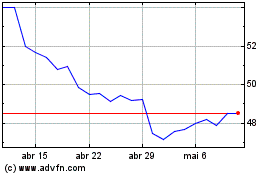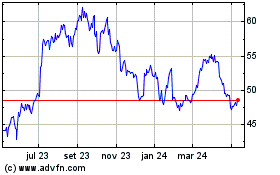Stock Market News for April 19, 2011 - Market News
19 Abril 2011 - 6:06AM
Zacks
Markets suffered their biggest fall of the month
as Standard & Poor downgraded long-term US sovereign debt
rating to “negative” based on the country’s incremental budget
deficit. European sovereign debt worries and China’s move to
increase bank’s reserve ratio requirements added to the
gloom.
The Dow Jones Industrial Average (DJIA) slipped
1.14% to 12,201.59. During the day, the Standard & Poor’s 500
Index had plunged below 1,300 for the first time since March 24 but
rebounded to close at 1,305.14, shedding 1.10%. The Nasdaq
Composite Index dropped 1.06% to close at 2,735.38. The fear-gauge
CBOE Volatility Index (VIX) increased 10.7% and posted its highest
daily percentage increase since February 22, 2011. Volumes remained
low and were at 7.83 billion shares on the York Stock Exchange, the
American Stock Exchange and Nasdaq as against last year's daily
average of 8.47 billion. On the NYSE, for every five stocks that
declined, only one managed to advance.
At 9 a.m. in New York, before the markets opened,
rating agency Standard & Poor’s cited concerns over the US
budget deficit compared to its ‘AAA’ peers and downgraded the U.S.
sovereign debt rating from stable to “negative”. This development
weighed heavily on the markets and none of the indices were able to
rebound from the lows even with the release of several earnings
reports. S&P is concerned that policy makers might not be able
to reach a budgetary restriction by 2013 and suggested that the
nation in on far worse ground than other AAA rated nations. This
downgrade has caused more jitters as the rating agency had not
downgraded the credit rating of US even during the economic turmoil
of 2008. S&P did not alter the ‘AAA’ long-term or the ‘A-1+’
short-term credit ratings. The effects of the downgrade will not be
restricted to the equity markets of the US but will likely cause
ripples across the global economy. S&P warned: "We believe
there is a material risk that U.S. policymakers might not reach an
agreement on how to address medium and long-term budgetary
challenges by 2013," and added: "If an agreement is not reached and
meaningful implementation is not begun by then, this would in our
view render the U.S. fiscal profile meaningfully weaker than that
of peer AAA sovereigns."
Meanwhile, financial markets were weighed down by
concerns over the European sovereign debt crisis while Spain paid
substantially more to issue 12 and 18 month Treasury bills while
investors shrugged off reassurances by European officials that
Greece will not be required to remodel its debt. Subsequently,
Athens two-year note yield plunged towards 20%. Yields on Greece’s
2.5 year-bond surged 18% while yield on Spain’s 10 year bonds
gained 5.5%. After a strong showing of True Finns party of Finland
on Sunday, elections will likely derail the approval of the bailout
package to Portugal as the party was earlier opposed to the
European Union’s bailout decisions.
In other news, the People’s Bank of China raised
its reserve ratio requirements in a bid to fight inflation. This is
the fourth time the Chinese bank has taken such a step this year.
The statistics bureau, last Friday, had reported that the gross
domestic product has surged 9.7% in the first quarter on a yearly
basis while inflation has escalated to its highest level since July
2008, at 5.4%. The central bank raised the commercial banks’
reserves with the central bank by 50 basis points or to 20.5% with
effect from 21st April.
The downgrade of the US sovereign debt rating
also pulled down crude prices as investors anticipate a drop in oil
demand. Light, sweet crude for May delivery dropped 2.3% to $107.12
per barrel on the New York Mercantile Exchange. Separately, Saudi
Arabia reported a drop in oil production in March due to softer
demand. However, Saudi Arabia’s oil minister, Ali al-Naimi,
expected a slightly higher oil output in April compared to March
levels. The energy sector led the decliners in the S&P 500
index with a 1.5% drop. Shares like ConocoPhillips (NYSE:COP),
Exxon Mobil Corporation (NYSE:XOM), Chevron Corp. (NYSE:CVX),
Occidental Petroleum Corporation, Valero Energy Corp., Chesapeake
Energy Corporation (NYSE:CHK) and Schlumberger Limited (NYSE:SLB)
shed 1.9%, 1.4%, 1.6%, 1.7%, 1.7%, 2.3% and 2.2%,
respectively.
Boeing Co. (NYSE:BA) was the only gainer among
the Dow components and edged up 0.3%. The laggards included Alcoa,
Inc. (NYSE:AA), Caterpillar Inc. (NYSE:CAT) and Bank of America
Corporation (NYSE:BAC) and they dropped 2.4%, 3.1% and 3.1%,
respectively.
Coming to the earnings season, significant
companies scheduled to report earnings today include The Goldman
Sachs Group, Inc. (NYSE:GS), International Business Machines Corp.
(NYSE:IBM), Intel Corporation (NASDAQ:INTC), Johnson & Johnson
(NYSE:JNJ), Linear Technology Corp. (NASDAQ:LLTC), U.S. Bancorp
(NYSE:USB) and Yahoo! Inc. (NASDAQ:YHOO).
ALCOA INC (AA): Free Stock Analysis Report
BOEING CO (BA): Free Stock Analysis Report
BANK OF AMER CP (BAC): Free Stock Analysis Report
CATERPILLAR INC (CAT): Free Stock Analysis Report
CHESAPEAKE ENGY (CHK): Free Stock Analysis Report
CONOCOPHILLIPS (COP): Free Stock Analysis Report
CHEVRON CORP (CVX): Free Stock Analysis Report
GOLDMAN SACHS (GS): Free Stock Analysis Report
INTL BUS MACH (IBM): Free Stock Analysis Report
INTEL CORP (INTC): Free Stock Analysis Report
JOHNSON & JOHNS (JNJ): Free Stock Analysis Report
LINEAR TEC CORP (LLTC): Free Stock Analysis Report
SCHLUMBERGER LT (SLB): Free Stock Analysis Report
US BANCORP (USB): Free Stock Analysis Report
EXXON MOBIL CRP (XOM): Free Stock Analysis Report
YAHOO! INC (YHOO): Free Stock Analysis Report
Zacks Investment Research
Schlumberger (NYSE:SLB)
Gráfico Histórico do Ativo
De Jun 2024 até Jul 2024

Schlumberger (NYSE:SLB)
Gráfico Histórico do Ativo
De Jul 2023 até Jul 2024
